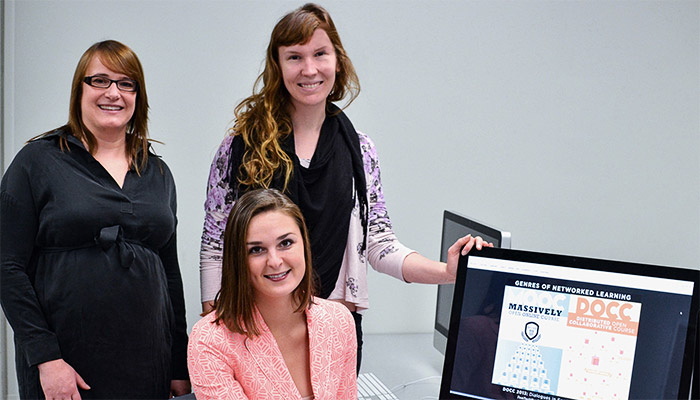When Jade Ulrich ’14 and Susie Ferrell ’15 won MIT’s Open Learning Innovation Contest, they were determined to use their prize to bring feminism to the top of the online learning agenda.
Ulrich and Ferrell received a $2,000 honorarium; those funds helped create a film “Feminist Dialogues on Technology,” a FemTechNet-sponsored DOCC offered at 31 schools this fall semester. The two students orchestrated a keyword discussion of the term WikiStorm, between Wikipedian scholar Adrianne Wadewitz and science, technology, and society professor of Jacqueline Wernimont (pictured above).
DOCC stands for Distributed Open Collaborative Course, a revolutionary new approach to online learning. “What differentiates DOCC from other kinds of online learning is that it isn’t massive,” says Ulrich. “It’s distribution targets specific people with interests such as feminism and technology who are not being answered elsewhere.”
A beta launch of DOCCs at Pitzer College last spring piqued Ulrich and Ferrell’s interest in the area.
“Professor [Alexandra] Juhasz believes in considering the feminist perspective in everything we learn,” says Ulrich. “We read a wide range of feminist works and applied what we learned to our everyday experiences. For instance, I remember examining digital art and the politics that dictate what is archived and how it’s done.”
As a double-major in art and art history, the topic of digital art hits close to home for Ferrell. “I work a lot in video art and animation, and online platforms are the easiest way for me to showcase my work,” she says. “Having an online identity is really important for artists in my field to gain recognition.”
The overall lack of female representation online also motivated Ulrich and Ferrell to become involved in Wikistorming, an effort to diminish gender bias on Wikipedia – an enormous web presence where only 10 percent of its editors are female.
“Through Wikistorming, we want to incorporate a feminist perspective into articles, elaborate on articles important to feminism, and help women realize they can make valuable contributions to one of the largest and most widely used encyclopedic collections of information in the world,” says Ferrell.
Ulrich, from Bellingham, Washington, and Ferrell, from Palo Alto, California, hosted “Wikiathons,” during which participants registered for or signed into their Wikipedia accounts and devote up to three hours editing articles. “They’re fun because people can angle it to their interests,” says Ulrich.
“Sometimes people think movements such as Wikistorming are too small to bring about real change, but the coverage and feedback we receive prove otherwise,” she adds. “And as an activist, it’s exciting to see how learning in the classroom translates to activism in the real world.”


